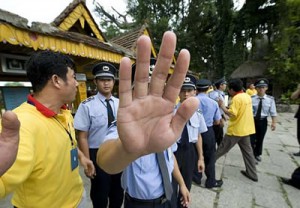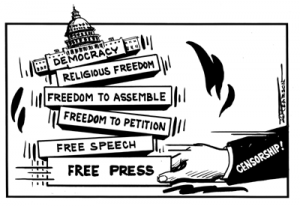What is Wrong With the Chinese Media Reciprocity Act
Part 1 of a three part series on the Chinese Media Reciprocity Act & foreign journalists in China
Last month, the U.S. House of Representatives’ Committee on the Judiciary held a hearing on the “Chinese Media Reciprocity Act” (H.R. 2899), a bill introduced last fall by Representative Dana Rohrabacher of California. The Act attempts to combat China’s restrictive visa policies for U.S. government-employed journalists. Instead of issuing journalist visas to most if not all Chinese journalists in the U.S., the Act would require that the number of visas issued to Chinese government journalists be identical to the number of visas that China issues to U.S. government reporters.
In reality, the impact of the Chinese Media Reciprocity Act is anything but reciprocal. The U.S. has two government-sponsored news agencies in (or trying to get in) China: Radio Free Asia (RFA) and Voice of America (VOA); the remaining U.S. journalists in China work for private media outlets. China on the other hand, with its state-owned media, has 13government-run agencies and over 800 media personnel working in the U.S. If passed, within 30 days, the State Department would be required to revoke the number of visas issued to Chinese journalists to equal the number of visas issued to American government journalists in China which currently stands at 2. The Act would all but eliminate a Chinese media presence in the U.S.
Given its extreme and inflexible nature, the Act shouldn’t be passed. But it does highlight a truly important issue: the harassment, censorship and expulsion of foreign journalists from China and raises the issue of what the U.S government should do about it.
The Act has many problems. First, it solely focuses on China, giving it the air of a Chinese Exclusion Act. China is not the only country which denies foreign journalists visas – a quick review of the worst countries for journalists on Reporters Without Borders’ website reveals that Burma, Iran, North Korea, Syria and Eritrea similarly deny foreign journalists visas. But this Act is exclusively about China.
Second, the rhetoric by the Act’s proponents leads one to believe that they are more motivated by a Cold War mentality than a true concern about U.S. journalists’ access in China. Rep. Rohrabacher’s testimony in support of the Chinese Media Reciprocity Act is filled with red herrings concerning Confucius Institutes, billboards in Times Square, and the Chinese purchase of AMC movie theaters (in order to flood the US with Chinese propaganda films). Testimony by John Lenczowski focused more on Russian spies in the US Embassy in Moscow during the Cold War than the actual treatment of U.S. journalists in China today.
Third, passage of the Act could lead to even worse retaliation by China. China repeatedly harasses the two VOA reporters in China (see Nick Zahn’s testimony, p. 5-6) and it has consistently denied visas to RFA reporters. Perhaps the most famous incident was when the Chinese government rescinded the RFA reporters’ visas only days before they were to accompany President Clinton on his 1998 trip to China.
But other major media outlets, like the New York Times, the Wall Street Journal, NPR, and CNN, just to name a few, have reporters on the ground in China doing some hard hitting reporting. Yes these reporters are also often harassed and are often forced to wait months for a visa or are threatened by the Chinese security apparatus that visa renewal will be denied (one of the Washington Post’s China reporters – Andrew Higgins – has been waiting for a visa since 2009, forced to report from Hong Kong). But in general, most reporters are able to renew their visas and solid reporting from China is able to make it to our shores. But some, like the Committee to Protect Journalists, warn that passage of the Chinese Media Reciprocity Act could lead to an all out visa war, resulting in China denying a greater number of visas and exacerbating an already tense situation for foreign journalists there.
Finally and perhaps most importantly, is this who we want to be? A free and vibrant press has been a central tenet of the United States; it was  crucial to the success of the American Revolution, is encapsulated within the First Amendment, and is rarely if ever abridged. As Americans, we understand that the press is a building block to creating a government truly accountable to its people; unfettered press access is an important goal in and of itself.
crucial to the success of the American Revolution, is encapsulated within the First Amendment, and is rarely if ever abridged. As Americans, we understand that the press is a building block to creating a government truly accountable to its people; unfettered press access is an important goal in and of itself.
In recent years, China has seen some developments in a more professionalized and freer press. Yes, the Chinese press still has to take its most of its cues from the Chinese government, but there has been some development in more real reporting (see Susan Shirk’s Changing Media, Changing China). But by essentially eradicating the Chinese press from U.S. shores, the Chinese Media Reciprocity Act undermines our goals of this burgeoning freedom of the press in China. Even the reporters harassed by the Chinese government do not agree with such actions. Peter Ford, president of the Foreign Correspondents Club of China (“FCCC”), told China Law & Policy that they “do not support efforts to restrict press freedom in one country in an effort to improve press freedom in another. We remain committed to freedom of the press.”
But all the attention surrounding the Act raises the issue of Beijing’s treatment of foreign journalists. Is there anything the U.S. can do to change what appears to be the Chinese government’s increased harassment of foreign journalists?
 On Facebook
On Facebook By Email
By Email 

[…] 中国法律与政策网的Elizabeth M. Lynch有一些关于法案的精彩文章,里面详细的列出了外国记者协会的成员记者遭遇的获得或更新他们签证所遇到的问题。例如,华盛顿邮报的Andrew Higgins从2009年开始就等待他的签证。还有一个美国记者,Melissa Chan,因为违反不知名的法律法规在2012年5月份被驱逐出境。外国记者协会记载了无数个发生在外国记者身上遭到中国政权机关阻碍或殴打的事件。但是最近外国记者协会停止报道这方面的事件,因为担心他们在中国的经营会遭到关闭。 […]
The edge is less likely to bend, so it will stay sharper for longer.
Familiarize yourself with a little more about the tools prior
to making a decision. Chopping, slicing, dicing, and peeling, can be so much easier with a set of great quality, forged steel knives
that have handles that enable a firm, sturdy grip.
[…] 4 started off with a bang. Last July, we ran a three part series on the proposed legislation in the United States known as the Chinese Media Reciprocity Act that […]
[…] 中国法律与政策网的Elizabeth M. Lynch有一些关于法案的精彩文章,里面详细的列出了外国记者协会的成员记者遭遇的获得或更新他们签证所遇到的问题。例如,华盛顿邮报的Andrew Higgins从2009年开始就等待他的签证。还有一个美国记者,Melissa Chan,因为违反不知名的法律法规在2012年5月份被驱逐出境。外国记者协会记载了无数个发生在外国记者身上遭到中国政权机关阻碍或殴打的事件。但是最近外国记者协会停止报道这方面的事件,因为担心他们在中国的经营会遭到关闭。 […]
[…] M. Lynch at the China Law & Policy website has an excellent series of articles on the proposed law that details problems experienced […]
[…] a three part series on the Chinese Media Reciprocity Act & foreign journalists in China (Click here for Part 1; click here for Part […]
[…] Part 1: What is Wrong With the Chinese Media Reciprocity Act […]
[…] of a three-part series on H.R. 2899, China Law and Policy explains this difference, and reports other major problems with this bill:The Act has many problems. First, it solely focuses on China, giving it the air of a Chinese […]
Changing media? I do not see any essential change except the social media that the governments have trouble to control completely, although they are trying very hard. does US have a policy that government owned media are not allowed to operate domestically? however they are allowed to operate abroad for influencing foreign countries, then why Chinese state owned CCTV can not do propaganda in US? However, Chinese governments behave like thugs, if US governments still want to be gentlemen, which you can’t afford not to be, you are doomed to lose. so my suggestion is that US stops running VOA and RFA completely, so that you can ban any foreign governments owned media as well. fair and consistent!
[…] Part 2 in a three part series on the Chinese Media Reciprocity Act & foreign journalists in China (For Part 1, click here) […]
Apparently my earlier comment has been censored. What a spirit over the concept of free speech.
Hi Wei Ling,
Thank you for reading the post and thank you for your comment. I just reviewed all the comments that have been made today, including spam, and I don’t see another comment from you. I haven’t removed any comments. So it wasn’t censored. Maybe you accidentally forgot to press the post button?
Our policy here on comments is pretty open. Aside from foul language, personal attacks and comments that have nothing to do with the post, we don’t remove comments.
Please feel free to re-post the first comment to the blog post again.
Thanks again!
Best,
Elizabeth Lynch